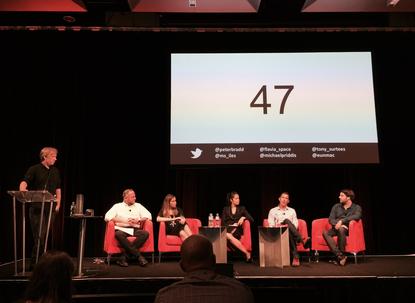Expert panel: Australia must innovate or bust
- 17 March, 2017 08:12

From left to write: AIIA committee member, Tony Surtees, Fleet CEO, Flavia Tata Nardini, Change CEO Caitlin Iles, Faethm CEO Michael Priddis and Beanstalk CEO & co-founder, Peter Bradd
Artificial intelligence, robotics, and the Internet of Things will place increasing pressure on job security, forcing companies to rethink the way they upskill staff and effectively manage talent, according to a panel of experts at ad:tech Sydney 2017.
In 2013, two guys from Oxford University predicted that 47 per cent of US occupations will be automated as a result of AI or related technologies in the next 10-15 years, R&D firm Faethm’s CEO, Michael Priddis, claimed.
“So how will we adopt these technologies and how will we experiment with AI, robotics and IoT?” he asked. “Which platforms are we going to use to build our strategies fast? Importantly, we also need to ask what it means for our jobs and our transition. Personally, I don’t think companies or people are prepared for the changes, which have already begun.”
Beanstalk CEO and co-founder, Peter Bradd, said the cost to the Australian taxpayer is going to be huge if we these technologies are not harnessed in the right way. He suggested now is the time for the Federal Government to support small and big businesses to innovate using these emerging innovations and help keep employee skills relevant.
“Nobody seems to be talking about it, but it has huge repercussions for Australians across the board,” he said.
CEO of business education company Xchange, Caitlin Iles, said recent figures are even more staggering, with warnings that up to 90 per cent of jobs will be gone in 10 years.
“One of the things we need to do is look at education, and rethink the rise of non-traditional options for the future generation of the workforce,” she said. “Industry experience is so important, and it’s critical with brands to be as upskilled as you can be to remain relevant and competitive.”
While Australians have consistently proven to be great innovators, Iles said the fault is in the commercialisation. Too often, “we’re too comfortable in thinking we have everything at hand”, she said.
“But if you look at a place like Israel, the willingness to take risks in starting up a business is much higher, as you’re more concerned with your everyday well-being, that you just get on with it,” she said. “I think we need to focus more on commercialisation and collaboration. We need to work together better to support the overall ecosystem.
But Australian Information Industry Association (AIIA) committee member, Tony Surtees, remained optimistic and opportunistic about the shifting landscape ahead.
“We need to encourage entrepreneurs who wish to partner with us to innovate,” he said. “It used to cost a lot of money to start a Silicon-Valley style startup. Now it costs a fraction of that, which is why we are now seeing an explosion of incubators. The barrier to entry to build an Internet-based business or brand has reduced to as little as $50,000. And the change is coming.”
CEO of space tech company Fleet, Flavia Tata Nardini, agreed. She stressed Australia is ripe for startup and innovative disruptors as the community is small but people are super smart and willing to take up the opportunities available.
“I’m very confident to see what Australian businesses can do moving forward,” she said. “And I’m very positive to see the changes ahead.”
Follow CMO on Twitter: @CMOAustralia, take part in the CMO conversation on LinkedIn: CMO ANZ, join us on Facebook: https://www.facebook.com/CMOAustralia, or check us out on Google+:google.com/+CmoAu

